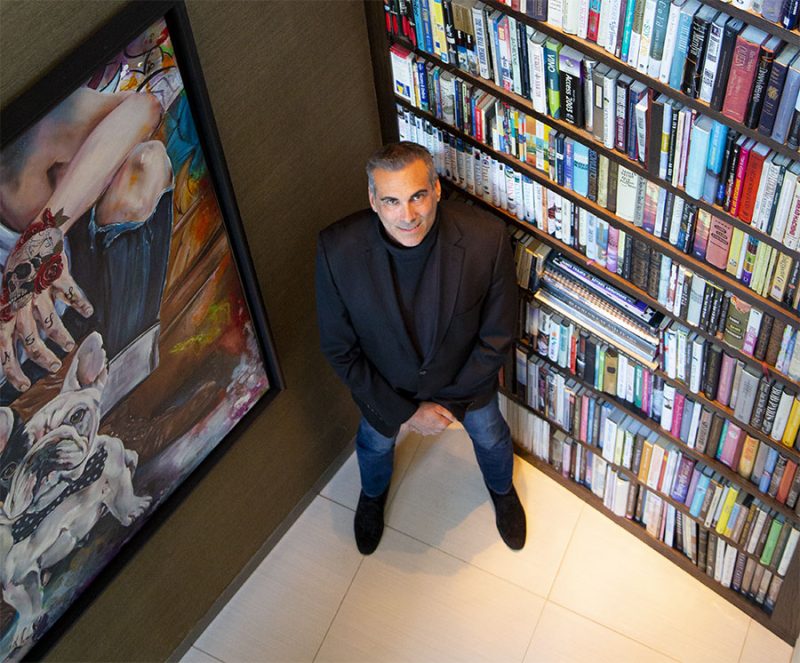Alan Nevins fell into the publishing industry by accident. If it hadn’t been for an Alpine skiing mishap in the 1990s, he may have never found himself on the cutting-edge of the literary business as an agent.
Nevins cut his teeth in the literary world with the Irving Paul Lazar Agency. He learned much of what he knows from working closely with Hollywood’s first “super-agent” Irving “Swifty” Lazar, owner of the firm. Forming a working relationship with Lazar helped Nevins reach incredible heights. Today, Nevins boasts a list of who’s who clients from all over the world.
It wasn’t always a road paved with gold, however. After working for others in talent and literary management, Nevins was able to go solo once again in 2008, pushing it to new boundaries.
Alan, you are the president of Renaissance Literary & Talent, and have been running the company since 1993. First off, can you tell us about starting the company nearly 30 years ago and what led you to found your own business?
Long but semi-interesting story about how I got here. My entire entry into this industry was a complete and total fluke. I can’t be more honest and less pretentious than that statement. I had been working in television as a production assistant and a script supervisor for a really nice group of people who were producing the HBO show Not Necessarily the News, as well as, shows like the annual fundraiser Comic Relief, hosted by Robin Williams, Whoopi Goldberg and Billy Crystal. I worked under a woman named Jules Stewart who trained me and took me under her wing. For years, in addition to our ongoing gig, she would find us employment on independent shows around town and slowed only slightly when she gave birth to her daughter, the actress Kristen Stewart. I remember pushing Kristen in her stroller around the production office.
It was during those production years that a fortuitous tragedy struck while I was on holiday traveling Europe with my great friend Jami Heidegger (then Morse), whose family at that time owned the cosmetic company Kiehls Since 1851. She was the first and only American ever to become the dryland trainer for the nationally revered Austrian ski team. We had just arrived in Innsbruck and it was my first day of skiing among the Olympic teams, all gathered in Austria for training on a nearby glacier. I was standing on the side of a slope waiting for (multiple world record holder in speed skiing) Franz Weber’s girlfriend to catch up to me. There were two skiers who I thought were navigating this particular slope way too fast and, sure enough, they collided into one another and then slammed into me and broke my femur bone in two locations. I was flown off the glacier and over the Alps by helicopter and spent the next 10 days in traction and 17 days in the Innsbruck hospital. When I finally was able to return to Los Angeles, and was still walking with a bit of a limp, I could no longer run around the office or a studio floor in the way that was needed on a production. My friend, Maria Marill, very kindly introduced me to a woman named Mary Lazar, who had just been hired by publishing giant Simon & Schuster as their west coast acquisition editor. We got along fantastically, and I ended up working for Mary way beyond her two month commitment to me – about two years actually. She didn’t want to let me go and I was rather liking the publishing world so I worked with Mary during my hiatuses from production, which worked out really well for both of us.
Then the writer’s strike of 1988 hit and production came to a halt and so did the bulk of my income. This is the event that changed my life and set me on a course for which I will be forever grateful. Mary came to me and said her husband, the quite famous literary agent, Irving “Swifty” Lazar, needed help in his office and would employ me full-time. I had no clue who he was really except he was quite famous for throwing the post-Oscar bash at Spago each year. Not only did Irving keep me employed during that time but he allowed me free reign around the office to help make it function better. When the strike finally ended, Irving and Mary were in New York and he literally summoned me to NYC to work for a week. After multiple refusals on my part he made me an offer I couldn’t refuse. Within months I had wrapped up my production job and moved into the same office as Irving. And I don’t mean the same office space – I mean the same office. We shared a single office with two desks so that I would hear and see everything. About two years into that situation he declared me his associate and I started to take on some publishing clients. We continued for five years until one day in New York Mary went off to see her doctor while Irving and I took a stroll up Madison Avenue for some exercise and window shopping. Suddenly he felt quite ill and I rushed him to the hospital. Not only was he checked into the hospital but Mary called me to inform me she had liver cancer and it had metastasized throughout her body. She had only months to live and barely made it through the Christmas holidays into January 1993 – a holiday year seared into my memory for the wrong reasons.
It was at this time I was introduced to two agents in Hollywood, Joel Gotler and Irv Schwartz, who were striking out on their own and asked me to join them. Irving was going to stick with me to continue running his company until outside influencers caused him to withdraw, literally, at the midnight hour the night before we were moving into new offices. That was the beginning of Renaissance Literary & Talent. Later, after a few years at Mike Ovitz’s management company, Joel, Irv and I parted ways in 2002 and I ended up at The Firm, a music management company that was expanding by joining with Julie and Rick Yorn who were partners at AMG. I followed them both to The Firm, as I was rather fond of them, and ended up occupying the office next door to Steve Bannon who was their CFO at the time. Of course, he went onto infamy with Trump but he was a very brilliant guy and we got along well.
As a literary and talent agency, how has the publishing industry changed since the company was founded in 1993?
From where I stand, since I am not sitting in the publisher’s chair at a major publishing house, it has become more corporate. I remember when Michael Korda (the famous editor-in-chief at Simon & Schuster) could just buy a book on the phone and not need to go to his editorial board for permission. Now, it feels like each book is scrutinized and discussed at board and then, if the entire team agrees, they make an offer on the book. I’m not suggesting it is better or worse, just different. It felt “smaller” before – more friendly, more personal in some ways. Irving was known for bringing in books by big name clients like Lauren Bacall, Richard Nixon and Larry McMurtry. That was how my career started. But I didn’t find publishing very west coast friendly. I recall some of the more established editors would turn up their nose at celebrity books and certainly dismissed me because I was from Los Angeles. There was a real dislike of LA as being crude and unsophisticated and those books were considered merchandise and not real literature. The younger editors were much more open to those types of books and so that’s who I established relationships with. That has changed significantly and those young editors are now running publishing. They were more open, across the board, to different types of books, especially as they are under pressure from their corporate owners to show yearly increases in profits.
Nevins worked at agencies previously where everything was dealt with in a corporate manner. Deals were created and executed, not on a desire to work with an author, but on a group deciding what was good for business. Renaissance is run differently as a boutique agency, allowing Nevins to give everything his personal touch.
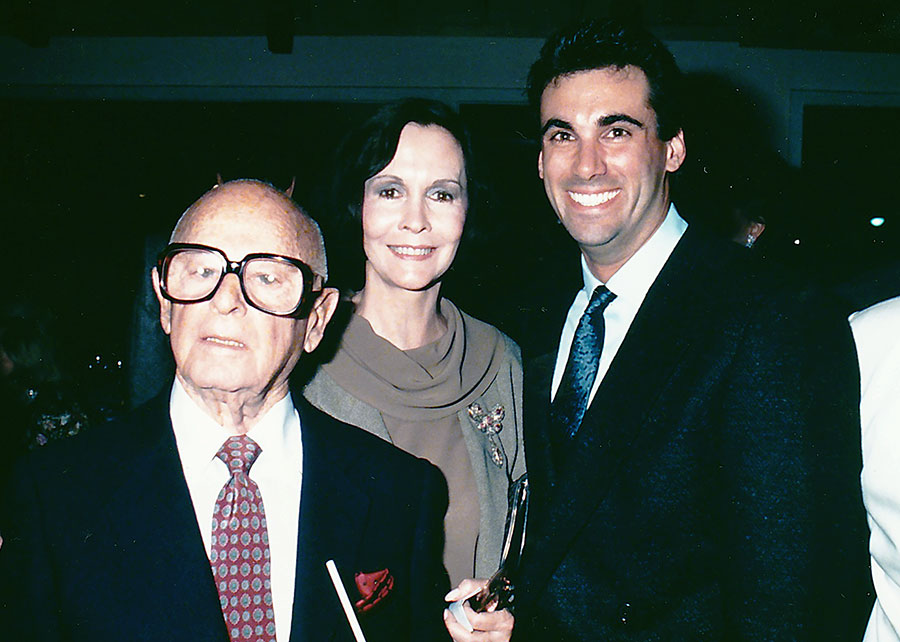
Alan and Irving and Mary Lazar. Spago Book Party
On the company’s official website, it states the company is a “boutique literary agency”. What makes it “boutique” and what exactly do you mean when describing the company as boutique?
When you want to buy inexpensive food in large quantities, you go to Costco. When you want the butcher to know your name and trim the fat off the meat in a certain way you go to a “boutique” market. In its simplest form, you could just say it’s smaller. But it’s more nuanced than that. Normally, it would mean independently run with no large corporate owners and the staff is smaller and you get a more intimate experience. If you are at one of the large agencies, who have excellent agents, it’s a much more corporate atmosphere. When I was at Ovitz’s company and The Firm there was nothing boutique about those operations; however, Renaissance always ran their division as a boutique operation within those companies and I was able to bend the rules a bit and just run my company within a company. We’ve always been more hand holding in our care and, thus, quite close with many of my clients. I cherish my clients and have been quite successful in ejecting those that don’t make my life better or more interesting or don’t bring me pleasure. I wake up in the morning energized for my work and that’s impossible to do if you don’t like the people you are working with.
What is the literary industry like today? Are people still reading and buying physical books or have you seen a major shift to digital reading?
People who love books will always buy paper books. I don’t see that going away soon. It’s part of the fascination – the paper, the smell, the texture and design of the cover. Personally, I have walls of books in my office and a three storey high bookcase in my home that is like a piece of art. I love the look, the pattern, the wealth of writing all in one place. It’s the best decoration when in doubt. Years ago, when eBooks were just getting off the ground, I was fascinated by the technology. There were publishers who told me people would never read books on a machine! In turn, I reverted hundreds of my client’s backlist titles which had gone out of print and we published them as eBooks. That business has flourished and we’ve published a few original books straight to Print On Demand and electronic editions. We have some major titles on our list now including 13 books by the mother of true crime, Ann Rule. We’ve also commenced publishing the entire backlist of 300 titles by Cornell Woolrich and they are selling quite well. I love my small publishing business. I consider eBooks as the new mass market publications. You used to be able to buy those cheap “pocketbook” editions as you checked out at the supermarket and you had no problem taking them to the beach and getting them dirty because you just wanted to read them and not necessarily put them on your bookshelf. eBooks now function in that capacity. You can download them instantly, many costing less than $6, and you can consume them quickly. For a while that business grew substantially for publishers but in the last few years there seems to be a small trend back toward paper books. There’s something about having a book on your side table next to the bed staring you in the face that works. Otherwise, you have to pick up your tablet, hope it’s charged, then open the reading app and then file through potentially hundreds of titles. It’s just not the same experience. That’s not to say I don’t love using my tablet to consume books.
I love that I can read with no lights on in the room late at night and it’s wonderful for work since I can carry the many books I need to read with me on my iPad. It has its advantages for sure. But if you don’t work in publishing and just want to sit by the fire and read a book on a cold day, there’s nothing like a paperbound book.
Nevins has always made the most of his opportunities. In 2008, with his previous employer going out of business, Nevins re-established Renaissance with a new drive and purpose. It enabled him to take Renaissance from the background and push it into the forefront for the first time in years.
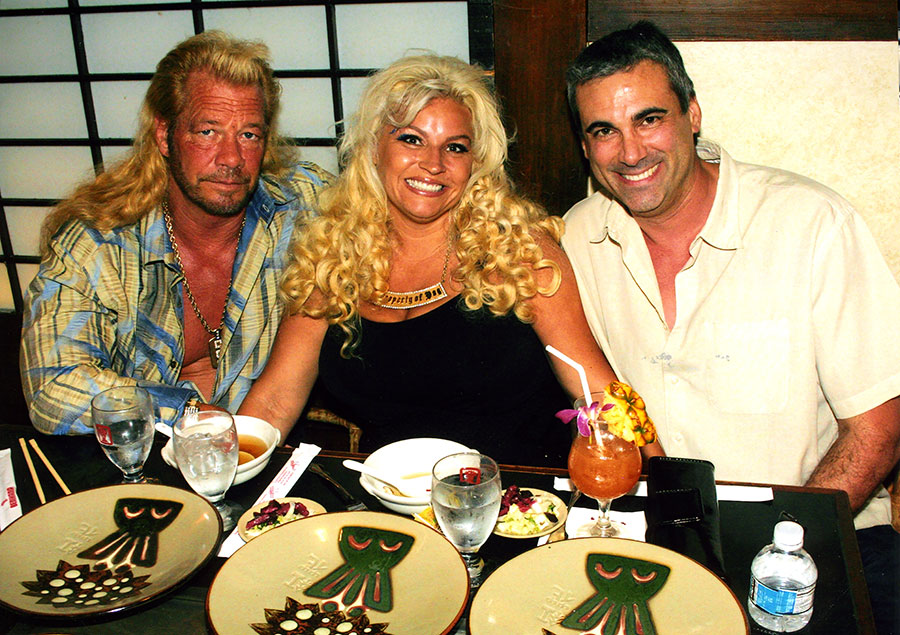
Dog the Bounty Hunter, Wife Beth and Alan at Benihana, Honolulu
In 2008, you re-established Renaissance. What led to you re-establishing the agency?
The Firm basically went out of business and I was under contract. Jeff Kwatinetz was a very fair guy and when he called me into his office to let me know they needed to cut overhead quickly, I didn’t hold them up for the balance of my contract and they allowed me to take all my clients and any future income. I called my previous two partners in Renaissance and said we’ve been running this agency in the background for nine years. I’d like to headline it again. They agreed and signed over all their rights to me. I placed the Renaissance banner out there for a second time and it’s been flying solo ever since.
I love working for myself. While my stints at AMG and The Firm were great learning experiences for me and I acquired a lot of clients during that time, there’s nothing like having your own business. Irving Lazar always told me not to work for the large agencies, “You will be sorry. You work for them and not yourself.” It turned out to be true but I didn’t hate it. I do, however, understand fully what Lazar meant. I represented Dog the Bounty Hunter during those years which were the biggest in his career, from Season three to Season eight of his show. He and his family were pulling down huge amounts of money and the network was ordering 26 to 28 episodes per season! If those commissions had been coming to me during that time, I would have been banking. Instead, it went to my employer. Working for yourself opens the door to living life. I work from a seven bedroom villa with a pool surrounded by 130 acres in Italy every summer. My staff comes part-time, my friends, family, clients and publishers from New York and London have stayed with me. I would never be able to do that working for someone else. The freedom is amazing and even though you are working hard, if not harder, you feel you are reaping the immediate benefits as you sit by the pool with a view of the Adriatic coast. It doesn’t feel like work at all!
As a literary agent, how difficult is it to get an author signed to a major publishing house these days?
This is a bit of a tricky question. If the author is really good, I don’t think it’s difficult at all. Or if the author has a major platform, such as a major movie star, then it’s not that challenging either. The curve of adversity goes up as the writing ability goes down. There are some writers who can spin a really great story but may not be the best wordsmiths around and then it can be challenging. While one may appreciate the story, publishers are, by nature, people who love good writing. They see many submissions where certain aspects of the book may be quite good while other pieces may fall short of enthralling. Publishers would prefer to have a book handed to them where the writer has conquered all the elements of writing and the editor doesn’t need to fill in the gaps where the author has failed. However, there are times when you want to take on that role. The writer who can create a complex storyline that really pays off has a unique talent and sometimes the editor can see the financial reward behind trying to help this author with their prose. In the end, most publishers, while being lovers of books and writing, do have to show financial success and that opens the door to books that may be less about their fine writing and more about their commercial value.
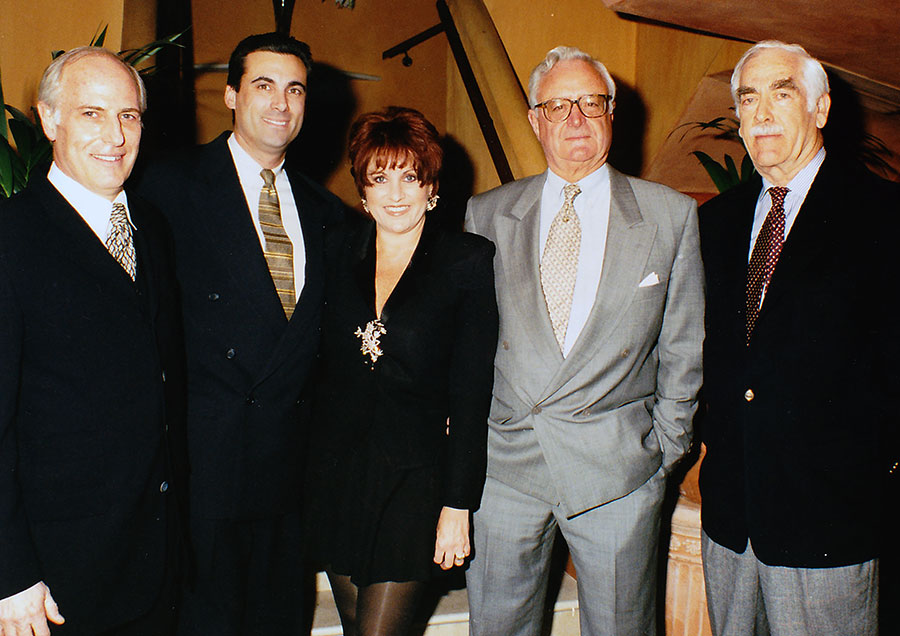
London Book Fair 1999. Joel Gotler. Nevins. Lorna Luft. Author Larry Collins. Author Don Wolfe
As an entrepreneur, what are some of the challenges you regularly face as president of Renaissance Literary & Talent?
I think I face the same obstacles and challenges as anyone running a company, whether large or small. The most obvious is that you have to make money, keep people employed, pay your rent and expenses and have enough left over to pay your personal bills as well. This means a constant conveyor belt of pushing products out there in order to generate income. That could get tedious if you feel like a factory but my office and staff have found great ways to keep everyday a challenge, new and different. Renaissance is unique compared to many other literary agents. Most agents exclusively sell books to publishers. We have many hats at Renaissance. I was very privileged that both Irving Lazar and my first two partners at Renaissance sold book rights to film and television buyers. There are agents out there who do that almost exclusively. It provided me the ability to have a second business where I sell my books to producers, studios and networks and do the same for other agents and publishers who are not familiar with that aspect of the business. As I mentioned above, we also became, in a small way, our own publisher. And we also book select clients into speaking gigs and personal appearances. While representing Goldie Hawn for her memoir, she pulled me into the speaker’s world. I learned enough about that business to represent some other people for their speaking engagements, like Diane Keaton, who Goldie very kindly introduced me to. Goldie also guided me further into producing when we embarked upon resurrecting a script from one of the studios she had written. The next thing I know I am selling movie rights to distributors in Italy and Germany and making deals with domestic studios. While we were in India together for a speaking gig, Goldie and I, in the middle of the night after a long dusty, dirty day of traveling, ran into Bette Midler. Bette and I struck up a nice little relationship and the next thing I know I had access to the three women from the First Wives Club. At their encouragement, I came up with an idea for a film and I sold it. We are currently deep into development on that project with the full backing of a studio and I’m working with a producer friend of mine who has kindly taken on the task of showing me those ropes. Something a little more odd happened recently when my friend and radio agent, Paul Anderson, suggested that I do a podcast after Melody & Marcella at Reach Media’s affiliate relations said I had a radio voice. I was totally against the idea but he arranged for me to go into a studio and I asked my longtime friend, celebrity chef Joey Santos, to co-host. We sent in the demo reel and Paul calls me 4 weeks later to tell me that legendary sports journalist, Dan Patrick, and iHeart have bought the podcast for 45 episodes! It’s pop culture, food, celebrity and, of course, publishing. Titled Two Guys From Hollywood and it launches January ‘21 across the massive iHeart network and anywhere you listen to podcasts. As you can see, I’ve moved far from the conveyor belt and every day in our office is incredibly exciting and diverse.
Nevins has been a part of some amazing projects over the years. From clients such as Lauren Bacall to the works of famous musicians, he has worked on a variety of books that have gone on to be best-sellers.
Can you tell us about some of the best known projects the company has been involved with?
I have a long list of authors that I’m very honored to represent. There are so many I’m afraid I might offend some if I don’t reference them.
First, I must mention Joan Collins. After Mary Lazar died it was Joan that recognized I needed a friend to help me through a terrible time. She invited me to parties and dined with me frequently and then followed me to my new agency. We became so close she included me within the wedding party inner circle when she married the charming Percy Gibson.
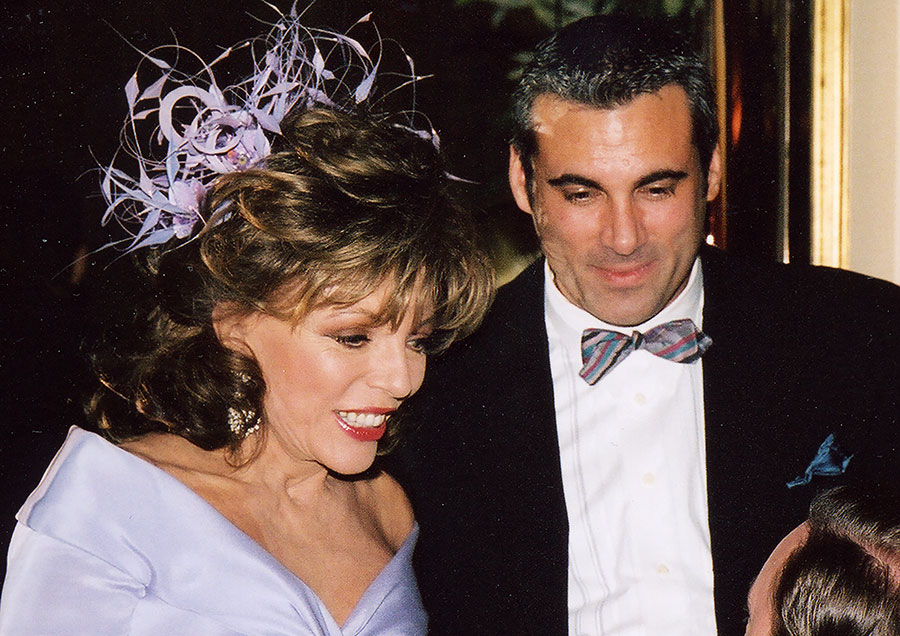
Joan Collins and Alan Nevins at her wedding in London, February, 2002.
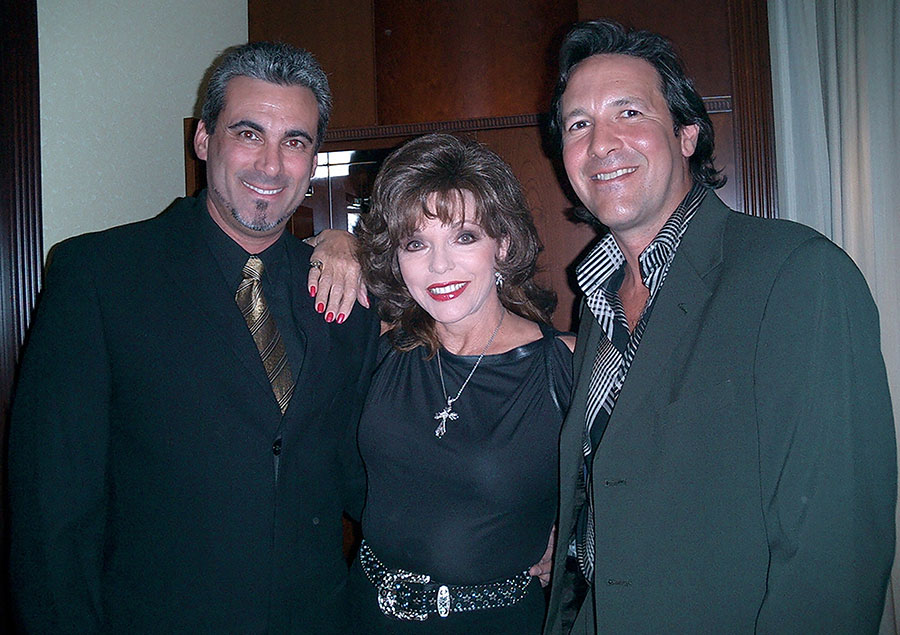
Alan, Joan Collins and her husband Percy Gibson in Berlin for the Golden Bear Awards. Feb- 2005
Photo Courtesy of Dame Joan Collins
I was thrilled to represent Lauren Bacall who was a client of Irving Lazar. They were very close. She was the one who actually gave him the name “Swifty” despite what you may read elsewhere. She called me one day while she was in Los Angeles and asked if I’d like to have lunch with her at the Bel Air hotel. I happened to receive a royalty check for her from her National Book Award winning memoir, By Myself. When I handed it to her at lunch I told her it was extraordinary that 23 years after publication she was still receiving royalties and maybe we should consider a 25th Anniversary edition and she could write new pages bringing the book up to date. We did end up publishing By Myself and Then Some which went onto become a bestseller again 25 years after the first publication. We became great friends after that and I would see her whenever I went to New York. We’d have lunch or dinner and spend the entire time laughing. She had a great sense of humor and we never had a dull moment. She would call me every few weeks just to check in and catch up and give me some good belly laughs. I miss her terribly.
I’ve represented Heidi Murkoff since about 2000. She is the extraordinary woman who created What to Expect When You’re Expecting which is the longest running book ever on the New York Times Bestseller List. The pregnancy and parenting series has sold over 42 million books worldwide and has been translated into 35 languages. She and her husband have been honored for their philanthropy and are the recipients of numerous awards. Her books have changed the lives of many women, especially in countries where they may not have great access to pregnancy healthcare. We’ve had great fun traveling the world together as she continues to educate and empower moms.
I briefly mentioned her earlier but Goldie Hawn is a national treasure as far as I am concerned. She’s funny and intelligent and has great empathy for people, animals and the planet as a whole. She came into my life in 2002, when we both arrived simultaneously at The Firm, and has been a major influence upon me since day one. Not only did I sell her incredible bestselling memoir, but we traveled together extensively, and she opened up new worlds to me. She treated me like family and included me across the board. Her passion for children turned into the MindUp program which has been a huge success here and abroad. In turn, we published 10 Mindful Minutes as a guide for parents to understand the program and the book became a bestseller and continues to sell. I am hugely grateful for this woman in my life.
I recently sold Cher’s memoir and, for me, it is one of my crowning achievements. She too was originally represented by Lazar but he passed before her first book was published, so I inherited that obligation. I’ve always been a fan as she has been a force of nature outside her normal world of entertainment, whether it be saving an elephant or campaigning for better protection for our military. For the past 25 years, I would call every few years to see if she was ready to publish her memoir. A few years ago I called and to my great surprise I received a positive response. I don’t know her well like many of my other clients but it doesn’t matter, as I am thrilled to be representing this incredible icon.
The list goes on and on from David Eisenhower and Julie Nixon to Patricia Gucci and the Estate of Audrey Hepburn. Don Felder of The Eagles to Snoop Dogg and Taboo from the Black Eyed Peas. I’ve also represented Danny Seraphine from the group Chicago and Lorna Luft, the daughter of Judy Garland, whose best-selling memoir was made into an Emmy Award winning mini-series. I represent the international best-selling duo of Larry Collins and Dominque Lapierre as well as Steven Saylor, who has written the critically-acclaimed Roma Sub Rosa series of historical novels. Steven is an amazing writer and deserves a larger reading audience. Also, Kirk Douglas, Tony Curtis and The Doors. Ray Charles Jr, Marlee Matlin and Dog the Bounty Hunter. Wendy Holden, who has penned eight successful biographies for my clients and Fieldy from the band Korn. You can see it’s a very broad list. But I would be remiss in not mentioning playwright David E. Talbert who went on to publish two novels and then became a successful director, whose recent release, Jingle Jangle, is receiving amazing reviews. He, in turn, introduced me to one of my management clients, comedian, entertainer and radio show host Rickey Smiley. One of the top African American radio personalities in the country today, I’ve been with Rickey now for almost six years and every day is a joy because this man has a huge heart and really cares about people. He makes me laugh and we connected from day one and it has been a privilege working with him. So many more clients, I would need a book myself to tell the stories they deserve.
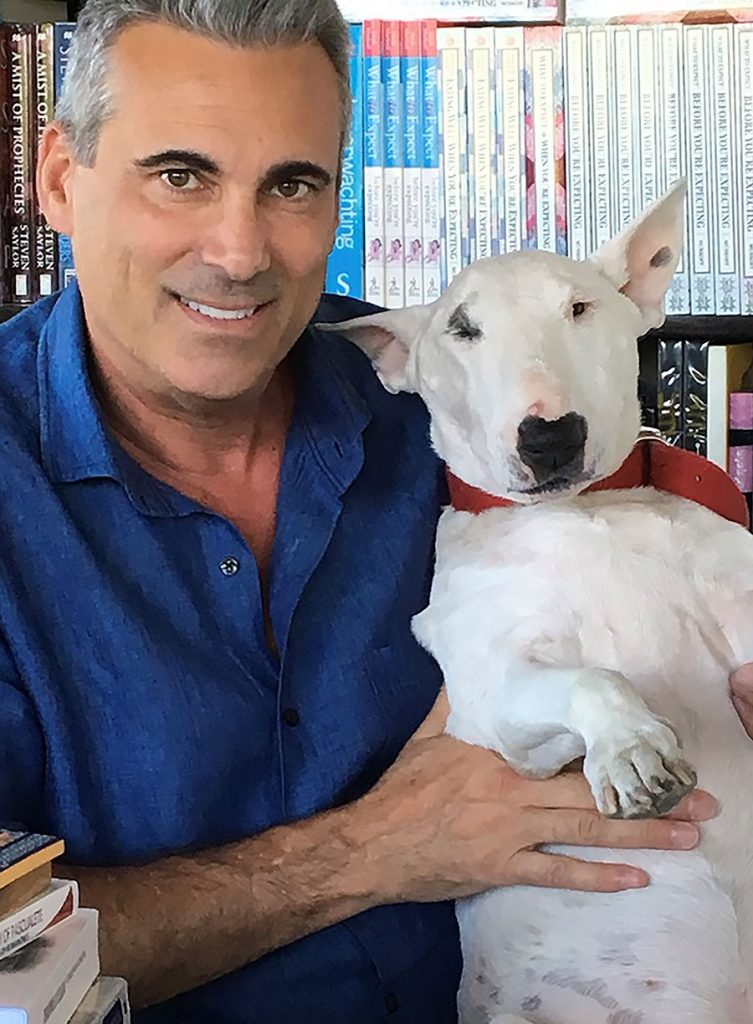
Alan and Murphy at Office. Photo courtesy of Brian Medavoy
What is the role of a literary agent and in a world of self-publishing how important is it for an author to connect with an agent?
To discuss self-publishing versus traditional publishing would need an entire article. You really don’t need an agent to self-publish, it’s one of the barriers that you push aside when you self-publish. However, when you sidestep the agent and then sidestep the editor and the traditional publisher, you also sidestep some of the elements that can create a successful author. But, as we all know, there are anomalies out there which break all the rules and self-publishing can be very profitable to an elite group of writers. A literary agent is really the first funnel a publisher relies upon to narrow the stream of books being fed into a publishing house. Publishers hope that agents are weeding out the material that would be a waste of time for a publisher to consider and only sending them viable material. That’s not to say that agents don’t dismiss viable material all the time. There are only so many books one agent can represent. Agents try to focus on the material they think has the best chance or has special interest to the agent. However, it’s not impossible for authors to go directly to publishers. Publishers do have slush piles of material they have received, but you may wait years until an editor picks that book up and reads it as they are so busy getting through the piles of material sent to them by agents. There are some huge authors in publishing today whose material was found in the slush pile.
What is the process of finding a client and getting their manuscript to a publisher?
The surprise for me was this unexpected and invisible success barrier. At a certain point in my career I noticed that I no longer needed to look as hard for clients and they were coming to me. And while I still chase clients that I want to work with, it is my choice to do so and much easier to sign them. There must be a name in a business book somewhere for this hidden barrier but it definitely added greatly to my work/ pleasure factor. I now spend more time working on projects that please me rather than those that are draining and my life is more rewarding and exhilarating.
It’s a fairly straight forward and clean process. Material comes into my office in many ways. It can come by recommendation of friends, colleagues in publishing or Hollywood, through my other clients many times or just by query letters sent to us via email. My office sorts through the material looking for something that catches our eye because of its subject matter, its ability to attract publicity or, hopefully, because of great writing and storytelling. Once we find that proposal or book, we contact the author and there’s a bit of getting to know each other and determining if it’s a personality fit. Then we prepare the submission to go out to the appropriate editors at various publishing houses hoping they see something special in the material as well. If so, they make an offer and we negotiate with them on behalf of the client. Since we also manage talent, we tend to be much more hand holding than many agents out there. I’ve gathered a few clients who left their agents because once the agent made their deal, they almost never heard from them again. We are much more of a family at Renaissance. I used to take on all sorts of clients because I saw something commercial in their work only to find out later it was not going to be a pleasant working experience for me. I’ve come to a place in my life where I need to get something out of this relationship other than money. I want my life to be fun, exciting, full of new wonder and discoveries. This is just not the writers journey. I have a journey of my own and I want the publication of my client’s book to be as exciting for me as it is for the client; otherwise, I no longer see why I should invest the limited time I have each day. So, if you have an exciting life and a great personality and story to tell, you would find yourself welcome at our door.
Nevins has an incredible history in the literary world. His own story of success is surely worth writing about and maybe, someday, will be a book too.
For now, Nevins’ goal is to get the books written by others to publishers and onto bookshelves around the globe. Book sales have been strong in 2020 as more people have found the time to read. With the need for great books and stories increasing, Nevins is sure to build on the success of Renaissance in the coming years.
For more information on Alan Nevins and Renaissance Literary & Talent visit https://renaissancemgmt.net

Journalist and author. Contributor

